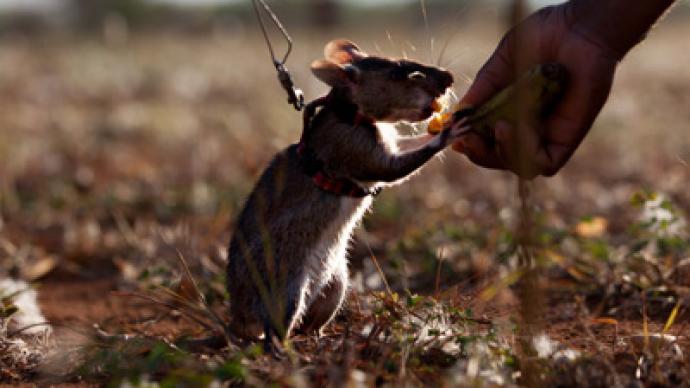Pentagon to recruit bomb-sniffing rats

A pet rat that can sniff out explosives could become standard gear for future American soldiers. The Pentagon is conducting research into teaching rats to detect mines and explosives, in hopes of saving lives and reducing military expenditures.
Scientists at the US Army Research Laboratory, supported by West Point Military Academy and engineers at the Counter Explosive Hazards Center busy studying rat psychology, reported army.mil, the US Army’s official website.These researchers are working with Barron Associates, Inc., a defense contractor that has been won a bid to produce a cheap and reliable training program for rats that can detect explosives in hostile environment.The Rugged Automated Training System’s (RATS) chief aims are low cost and ease of production. The program, managed by the Life Sciences Division of the Army Research Office, is expected to “solve an immediate Army need for safer and lower-cost mine removal," said William Gressick, senior research engineer at Barron.Despite being at least as intelligent and scent-savvy as bomb-sniffing dogs, rats are also much more mobile, easier to transport and consume much less food. They can also infiltrate hard-to-reach openings.Animals remain the most reliable explosives detection system, capable of identifying bombs at much higher rates than mechanical systems. RATS could also be used for non-military purposes. In the future, rats might be deployed by emergency teams on search-and-rescue operations.The program “would also create new opportunities for using animals to detect anything from mines to humans buried in earthquake rubble," said Micheline Strand, chief of Army Research’s Life Sciences Division."Training dogs is very expensive. If we can significantly reduce the cost of a trained animal, then we could provide more animals to protect soldiers," Strand said.The US is not the first country to consider using rodents to sniff out explosives. Several media outlets reported last year that Israel was training mice to detect bombs and drugs at airports. A report was released earlier this year detailing how Colombian police are training lab rats to detect hidden explosives.Between 15,000 and 20,000 people die annually worldwide because of landmines, which sometimes stay active for decades. Rats could become an indispensable tool for clearing minefields, making them safe for civilian use.














